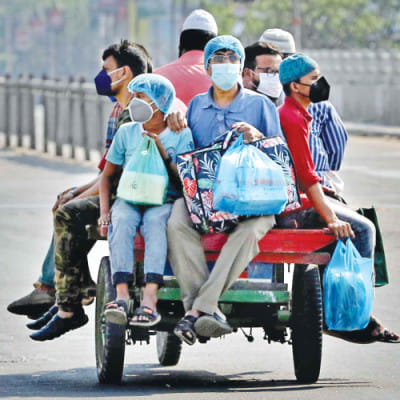Locally Made Three-Wheelers: Bribes keep them running

Despite being illegal and risky, they are used nationwide, thanks to the backing of influentials who find them an easy way to make a quick buck.
Tens of thousands of locally made three-wheelers have been operating for years, ignoring court and government directives issued to get them off the roads.
Over the years, the use of these vehicles, usually motorised by single-cylinder diesel engines meant for power tillers or pumping water and lacking even half decent braking capabilities, has seen exorbitant growth in districts, upazilas and rural Bangladesh.
They have become an unofficial part of the transport system.
Mostly unskilled, untrained, and unlicensed drivers operate these vehicles bribing local syndicates of some unscrupulous political leaders, policemen, and administration officials, insiders said.
When these slow-moving vehicles at the hands of unskilled drivers get on highways or roads alongside fast-moving vehicles, it becomes a perfect recipe for disaster.
Experts say the slow-moving vehicles are posing serious threat to road safety. But there is no visible initiative to get them off the roads even though people are getting killed because of them almost every day.
Yesterday, nine people were killed and seven others injured when one of these vehicles flipped into a roadside ditch in Shibganj upazila of Chapainawabganj.
These vehicles and similarly illegal easy bikes were involved in more than 15 percent of total 5,516 roads crashes last year, according to Bangladesh Jatri Kalyan Samity, a passenger welfare body.
The exact number of such vehicles on the roads is almost impossible to ascertain but people involved in the sector claimed that there were more than 10 lakh plying the roads.
BANNED, YET NOT
As per section 46 (4) of Road Transport Act-2018, nobody is allowed to operate faulty, risky, banned or restricted vehicles on roads and highways or issue permission to operate such vehicles.
The section explains that "Nasimon, Karimon, Bhatbhati, easy bike, powered rickshaw and van are such vehicles".
Even before the enactment of the law, Road Transport and Bridges Ministry imposed a ban on three-wheelers on 22 major highways in August 2015.
The High Court in January 2017 ordered imposing a ban on such improvised three-wheelers on highways across the country to reduce the number of road crashes.
Almost all probe committees investing major crashes over the last three years recommended stopping the movement of these locally made three wheelers and unfit vehicles on highways.
But the vehicles remained on the roads and highways.
Road Transport and Bridges Minister Obaidul Quader, on several occasions, admitted that the government could not fully implement the ban due to opposition from many politicians, including public representatives.
"Many politicians of the country are behind it. We give order [banning these three-wheelers] … on the other hand, many public representatives encourage the plying of such vehicles," he said at a views exchange meeting on September 4, 2018.
"Even though I want it [the ban], local representatives won't let it happen," a participant of a meeting of National Road Safety Council held in November 2017 quoted Quader as saying.
Osman Ali, general secretary Bangladesh Road Transport Workers Federation, said, "Some of these vehicles operate under 'minister's names', some under 'MP's names' and others under the local 'mayor's names'.
"The authorities should first investigate who actually manage the operations of these illegal vehicles," he told The Daily Star yesterday.
Another top transport leader said before putting one of these vehicles into service, the owner has to pay Tk 2,000 to Tk 3,000 to get it listed with so-called transport organisations, which are usually run by the local political leaders.
The owners also have to pay a particular amount daily and some people from police and administration get a cut, he said wishing anonymity.
Whenever the administration wants to take actions against these vehicles, the local leaders say it is cruel to the poor people who run these vehicles. "But the fact is they want to protect their interests -- money and vote," the leader said.
NO PROPER KNOWLEDGE OF SAFETY FEATURES
These vehicles are risky because makers of these vehicles do not have the proper knowledge about safety features while drivers are not aware of road-safety rules and regulations, said Prof Md Hadiuzzaman, director of Accident Research Institute of Buet.
"With the rise in the number of such vehicles, the number of road crashes will increase," he said, adding that the government should take immediate and strong steps to control them.
"It may not be possible to stop operations of such vehicles overnight, but the government should phase those out gradually and replace those with standard public transport," he added.
About easy-bikes, which are battery powered, he said some "authorities" are giving them permissions but these are also sub-standard. Apart posing risks of accidents on roads, they are also the reason behind traffic jams in towns.
The batteries are also one of the causes of environment pollution as they are not recycled.
Prof Hadiuzzaman said the prime minister issued a directive to formulate a masterplan for rural road network and the authorities should synchronise standard public transports with it.
Nur Mohammad Mazumder, chairman of Bangladesh Road Transport Authority (BRTA), the government's transport regulatory body, said mobile courts of the BRTA and district administrations were regularly conducting drives against such illegal vehicles.
Replying to a question, he said road transport and bridges ministry has formed a committee, led by an additional secretary of the ministry, to find a way out of this problem. The committee is yet to submit its report, he said.

 For all latest news, follow The Daily Star's Google News channel.
For all latest news, follow The Daily Star's Google News channel. 




Comments